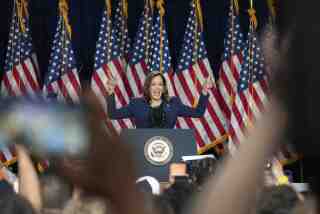An Upbeat Gore Hits the Campaign Trail
- Share via
OTTUMWA, Iowa — A sense of cautious confidence is creeping into Al Gore’s presidential campaign.
Just take a look at the candidate himself after a long day that began in Atlanta and was ending 740 miles, one presidential debate and two long church services later in Des Moines. Al Gore was still pumped.
“Run Al, Run,” the crowd at the United Baptist Church roared over and over, in the midst of a high-energy, rafter-raising program commemorating the birth of the Rev. Martin Luther King Jr.
“I will, I will, I will,” the vice president cried out. Then, carried away by the moment or a sudden charge of confidence that he is no longer able to hide, he shouted out above the cheers: “I’ll win. I’ll win. I’ll win!”
That was Monday. The church crowd was getting a rare look at the Impulsive Gore, the Gore who asked the choir for one more song, stood up, faced the singers and shifted his weight from foot to foot, swaying awkwardly with the music.
On Tuesday, the Earnest Gore was back. No dancing. No premature declarations of victory.
But among the crowds turning out to see him, there is a heightened energy. And his aides, reluctant to appear overconfident or even publicly confident, are thinking privately that a Gore wave is nearing a crest.
A Los Angeles Times Poll this week found the vice president with a 23-point lead in Iowa over Bill Bradley, his rival for the Democratic nomination. Recent surveys of New Hampshire, site of the nation’s first primary on Feb. 1, show the two Democrats are running nearly even.
“I think it’s a real tight horse race,” Gore said in an interview Tuesday.
And moving to undercut any suggestion on caucus night that something less than 50% could still represent a victory for Bradley, Gore said: “I am hoping for a win here in Iowa. And I think that regardless of what anybody says, a win is a win is a win. And that’s what I’m shooting for.”
An Upbeat Campaigner
Behind the scenes, Gore “feels good. He’s loose. He’s kidding around,” said Andrew Cuomo, the secretary of the Department of Housing and Urban Development, who spent Tuesday traveling with the vice president.
Throughout the autumn and early winter, Gore has been making his case to the potential voters across the state. Now, Cuomo said, “he feels his case has worked.”
“You continue to make your case, but since they are with you, it takes on a different style.”
Indeed, say those close to Gore, in private the vice president has been considerably more upbeat, for considerably longer, than he has let on.
Leaving a debate 10 days ago with Bradley, Gore’s first matter of business with aides was not to ask how they thought the debate had gone, but to get a thorough update on the NFL playoff game of the winning Tennessee Titans.
Iowans hold their party caucuses on Monday night--”five days, five-and-a-half hours” away, Gore said, before realizing he’d cut short the wait by one day. As time grows shorter, the vice president’s goal is to make sure his backers are sufficiently committed so that they will leave their homes regardless of the weather.
“It will be a lot easier for me to be in your corner if you put me in an office that doesn’t have any corners,” he tells members of the American Federation of Government Employees, referring to the White House Oval Office.
Bradley Vows a Fight to the End
As Gore’s 11-vehicle motorcade traversed the dun-toned pastures of southeastern Iowa, from Des Moines to Indianola, from Knoxville to Ottumwa, Bradley spent a subdued day, driving through a foggy morning from Des Moines to Iowa City.
There, speaking to a West High School auditorium packed with more than 700 students and plastered with hand-painted “Bill 4 Pres” signs, Bradley said he would take bold steps as president to lift up those left behind.
“We are the greatest country in the world and we’re at the time of our greatest prosperity,” Bradley said. “We should not settle.”
But the focus off stage turned to the prospects for his candidacy. Speaking with reporters, Bradley said he would stay in the race for the presidency even if he didn’t do well in Iowa or New Hampshire.
“This is a race where you try to get delegates, and March 7 is the big day when you have a national primary,” Bradley said. California, New York, Ohio and 12 other states vote then.
“This is a difficult state where you’re up against entrenched power, but I made a commitment to the Iowa caucus, and I’m keeping my commitment,” Bradley said. “We don’t have the apparatus. The apparatus is with the vice president. But we do have a lot of enthusiasm among people, and the question is, can we reach out to enough to get them to the caucuses. That remains to be seen.”
Gore, in an interview Tuesday with The Times, also struck a much more centrist note than he did in a debate Monday night on the issue of penalties for drug crimes. In that session, Gore criticized the criminal justice system’s treatment of minorities, saying “there are disparities in sentencing that need to be addressed.”
While Gore was not more specific, Bradley promised to reduce the disparity between penalties for crimes associated with crack and powdered cocaine. Bradley also indicated he would roll back mandatory minimum prison sentences for first-time, nonviolent drug offenders.
In the interview, Gore said he opposed such a rollback for drug offenses. And on the other issue, Gore said he supports reducing the disparities between crack and powdered cocaine by toughening the penalties for possession and sale of powdered cocaine.
“I think that the original justification offered for the difference between the sentences for crack and the sentences for powder cocaine have completely collapsed,” he said.
*
Times staff writers Matea Gold and Ronald Brownstein contributed to this story.
More to Read
Get the L.A. Times Politics newsletter
Deeply reported insights into legislation, politics and policy from Sacramento, Washington and beyond. In your inbox twice per week.
You may occasionally receive promotional content from the Los Angeles Times.










